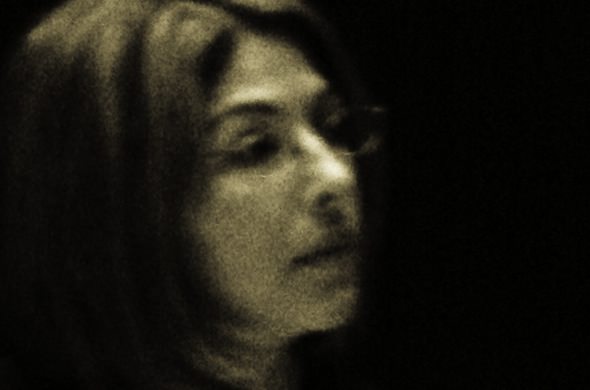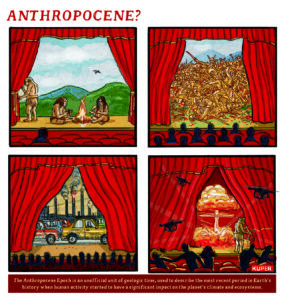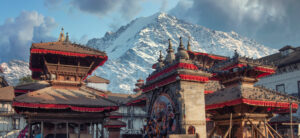Truthdigger of the Week: Naomi Klein
The aim of her new book on capitalism and climate change -- to rapidly get large numbers of previously unengaged people to agree that the leading wisdom is the very thing that is preventing humanity from saving itself -- is quixotic and urgent.The aim of her new book on capitalism and climate change—to rapidly get large numbers of previously unengaged people to agree that the leading wisdom is the very thing that is preventing humanity from saving itself—is quixotic and urgent.
Every week the Truthdig editorial staff selects a Truthdigger of the Week, a group or person worthy of recognition for speaking truth to power, breaking the story or blowing the whistle. It is not a lifetime achievement award. Rather, we’re looking for newsmakers whose actions in a given week are worth celebrating.
Anxiety over the state of the human future has tracked the same upward course of global temperatures ever since world leaders failed at the highly anticipated United Nations climate change conference in Copenhagen in 2009 to commit to a plan preventing the warming of Earth’s atmosphere to potentially uninhabitable levels. Sunday, that anxiety is finding expression in the form of thousands of people representing themselves and more than 1,500 organizations in a march southward through the streets of Manhattan two days before a new generation of government, business and civil society leaders converge on U.N. headquarters for a new round of presentations.
Hosted by Secretary-General Ban Ki-moon, the summit intends in the words of its website to “mobilize political will for an ambitious global agreement by 2015 that limits the world to a less than 2-degree Celsius rise in global temperature.” In spite of the conspicuous vagueness of that aim, many observers will no doubt marvel in frustration at the refusal of representatives of most of the leading nations to consider action that exceeds mild, financially anodyne manipulations of major industrial markets. This recognition on a mass scale of the inadequacy of the prevailing wisdom to deal with the accelerating emergency is owed to critics who have devoted themselves to understanding the intersection of the climate crisis and economics. Chief among them is journalist Naomi Klein.
Klein established herself as a strong critic of globalized and deregulated capitalism with “No Logo” in 2000. The book has been described in many places as a gospel of the anti-corporate globalization movement. “The Shock Doctrine” in 2007 led many readers to see proponents of deregulated capitalism exploiting mass natural, economic or other disasters as opportunities to expand business or push through new legislation and seize powers they would have never been granted in peacetime due to their anti-social nature. Her latest book, “This Changes Everything: Capitalism vs. the Climate,” brings the insights of her previous major works to bear on the climate crisis.
In the introduction to her book, Klein offers an answer to the question of why humanity’s institutions continue to fail to address the source of what appears to be its probable coming annihilation. “What is wrong with us?” she asks. “I think the answer is far more simple than many have led us to believe: We have not done the things needed to cut emissions because those things fundamentally conflict with deregulated capitalism, the reigning ideology for the entire period we have struggled to find a way out of this crisis. We are stuck, because the actions that would give us the best chance of averting catastrophe — and benefit the vast majority — are threatening to an elite minority with a stranglehold over our economy, political process and media.”
She goes on to list numerous wealthy celebrities who made bold public statements about taking on the climate crisis by overhauling their business models but who soon enough resumed or intensified their established practices because they were profitable. Virgin Airlines founder Richard Branson and tech mogul Bill Gates are exemplars of this crowd.
Contrary to the radically countercultural trappings of Klein’s cultivated milieu, her aim with her new book seems to be to bring a coherent vision of the climate crisis to the average voting American. As Guardian contributor Jenny Turner put it in her review of “This Changes Everything,” Klein’s “task is to take a potential catastrophe of unimaginable reach and to be calm and welcoming, drawing new people in. She does vast amounts of travel and research and thinking, then crafts all of it to the scale of her own voice: the voice of a pleasant, funny, unthreatening-looking woman with layerings and lowlights, a husband and a baby, living in Toronto.” And through it all — wading through the toxic effluent of BP’s oil disasters included — she endured two miscarriages. The experience enabled her to use the sudden arrest of life within her as a metaphor for the planetary scale arrest of life without. It’s a message that should resonate in particular with mothers who were not seduced into a personal engagement with the ecological problem by the sloganeering and other tactics of the environmental movement.
Her quest is essential, seemingly quixotic and urgent: to rapidly get large numbers of currently unengaged people to agree that what our leaders say are the best insights into economic organization and human behavior are in fact preventing the species from taking the necessary steps to save itself. Because of Klein, a whole generation of politically inclined readers disturbed by mass culture is able to articulate one of humanity’s basic and major problems this way. As the world changes and turns in the presence of her new book, we hope many more begin to speak her language. Naomi Klein is our Truthdigger of the Week.
Your support matters…Independent journalism is under threat and overshadowed by heavily funded mainstream media.
You can help level the playing field. Become a member.
Your tax-deductible contribution keeps us digging beneath the headlines to give you thought-provoking, investigative reporting and analysis that unearths what's really happening- without compromise.
Give today to support our courageous, independent journalists.






You need to be a supporter to comment.
There are currently no responses to this article.
Be the first to respond.